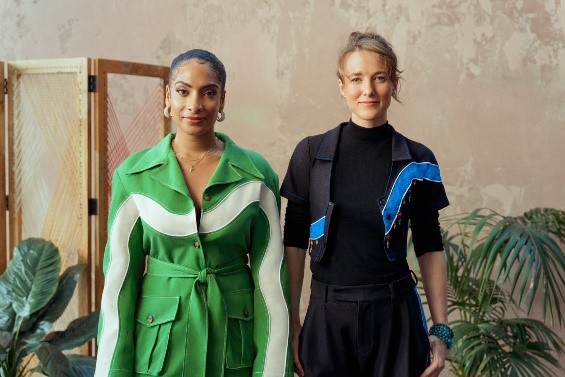On July 20, U.K.-based contemporary designer Priya Ahluwalia launched her namesake brand’s digitally connected fall 2023 collection. Through an integrated QR code, the pieces provide customers with access to brand storytelling, while providing the brand access to customer data. Digital ID startup EON and Cloud technology provider Microsoft partnered on the collection, which is now selling on the brand’s e-commerce site.
Ahluwalia announced the collection and the collaborators during London Fashion Week in February. Each included garment features a tag with a QR ID that users can scan using their phones. Doing so provides access to visuals of Ahluwalia’s inspirations for the collection, videos displaying how each garment was made and instructions on how to take care of the clothes. At the same time, it provides valuable data to the brand about how customers are engaging with brand content.
Five-year-old Ahluwalia has been profitable since its inception, and its sales have more than doubled each season since spring 2021. The brand declined to share specific revenue figures. Its e-commerce partners include Net-a-Porter, Matches and Farfetch, plus it’s stocked in over 40 physical stores worldwide.
“It’s not the easiest time, economically, but one of our main midterm goals is to open an [owned] physical location,” said Ahluwalia. “As a small brand that mainly does wholesale, collecting customer sales and engagement data is quite difficult. The [retailers] own the data of their customers. Owning channels as a small luxury brand and getting more information is a priority.”
The QR code works through EON’s Product Cloud Platform, a software backed by Microsoft’s cloud platform, Azure, that makes it easy for brands to upload information. The EON platform, launched in 2020, has been used by brands including Mulberry, Pangaia and Chloé. Ahluwalia declined to share the financial model for the EON x Microsoft partnership.
“The EON platform allows for self-service by brands, which has worked to attract smaller labels [without large enterprise teams] to the platform,” said Natasha Franck, CEO of EON.
The digital IDs also track the garment, capturing information that’s valuable during the resale process. As Franck described it, by scanning an item’s digital ID, a customer can upload the item and its corresponding information to a resale platform. In February, Chloé leveraged its EON data when it launched resale with Vestiaire Collective.
For Ahluwalia, which is a smaller brand, innovation via adopted technology is attainable. On the other hand, meeting minimum order requirements for innovative materials is impossible. Instead, the company prioritizes using deadstock.
Franck said that the E.U.’s mandatory digital identification for garments starting in 2027, along with the requirement of some supply chain disclosure starting as early as 2024, will mean that brands will need access to their supply chain data and trackable solutions will be necessary.
“A lot of brands have invested in material traceability, but they haven’t had a way to broadcast that information to the customer,” she said. With EON, the customer can view that information on their phone, with a quick scan.
“This will be a core commerce technology used by brand chief product officers; the ID is going to be essential in both the returns and resale [processes],” said Franck. Ahluwalia first partnered with Microsoft on technology integration in 2021, and it’s planning to integrate QR codes in all future collections.




